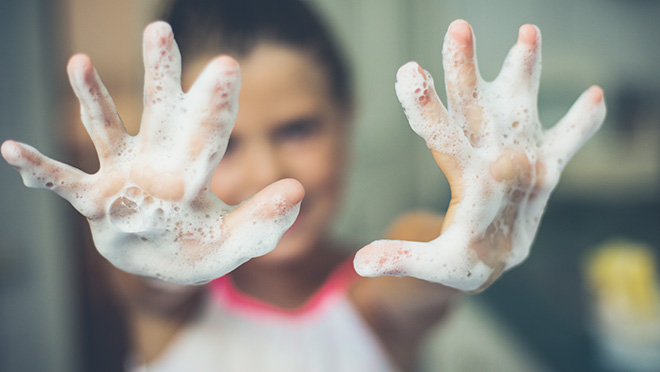Turning down the heat on washing hands and laundry

Use the right soap, and avoid using hot water
Have you ever washed your hands so much as you have in the last couple months? Have they ever been so dried out?
Well, if you haven't already, take care to use warm water (rather than hot) for washing your hands. The evidence shows that it's not the heat in the water that does the trick. It's the use of soap and how thoroughly you wash your hands. Avoiding hot water will reduce hand dryness that's often a product of all that handwashing.
While UNICEF states that all water temperatures are equally effective at killing germs and viruses, as long as soap is used, many health authorities in Canada are now recommending using warm water for handwashing during the coronavirus pandemic. Here are the Government of Canada's updated instructions on handwashing.
This is all a reminder, of course, that hot water isn't the go-to that it once was, for both handwashing and for doing laundry. Hand soaps and many laundry detergents work well with cold water. You'll also reduce the energy costs of heating water, and your clothes will look better – retaining their colour, shape and size – when you opt for a cold water wash.
Really? My clothes will be as clean with hot water?
There's some truth in the assertion that some laundry soaps require at least warm water to be fully effective, but if you take care to buy a cold water detergent, it will serve you well. And it's all about science.
Major detergent brands have introduced enzymes designed to work at colder water temperatures to the cold water versions of their detergents. At the same time, appliance manufacturers, with a nice push from ENERGY STAR®, are designing clothes washers that work increasingly well with cold or warm water. One study showed that in the U.S., the average laundry wash temperature fell about 11°C between 2002 and 2010. Expect that the warm wash setting on more efficient front-load washers is a much lower temperature than the setting on an old top-load model.
The savings? At BC Hydro's current rates, and based on three loads of laundry per week, you could save $22 a year. That may not seem a lot, but when you combine those hot water savings by taking shorter showers, turning off the tap while brushing your teeth or shaving, washing hands in warm water, and fixing any dripping faucets, the savings really add up.
For oily stains, pre-soak with a stain remover or use hot water
Hot water still does the best job of removing oily stains – and removing bacteria from blood- or urine-soaked items – so there's no getting around using hot water sometimes. Most stains can be removed with cold water washing if stained items are soaked in a pre-wash stain remover.